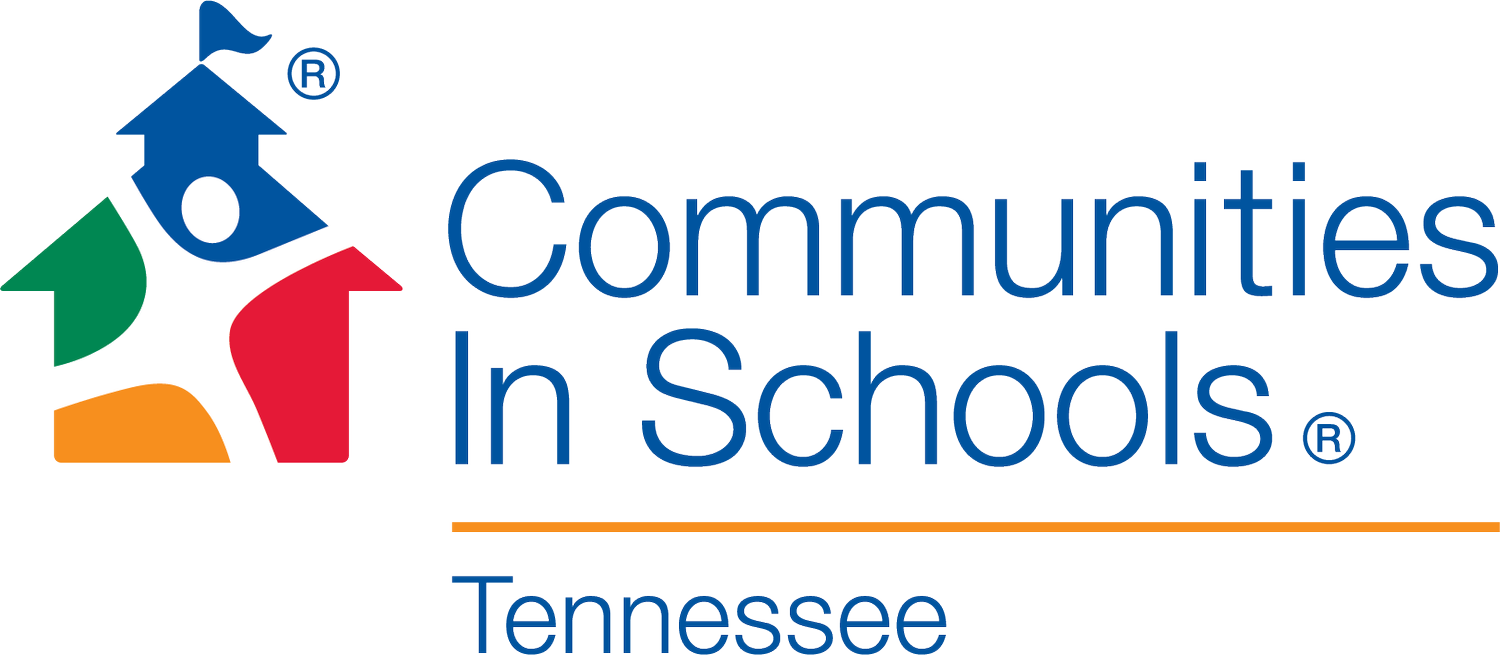
Working to Meet the Needs of the Whole Child
What We Do
Working directly inside our partner schools across the state, our school-based staff (known as program managers) provide a combination of one-on-one intensive case management services, small groups, and school-wide programs. The students and families we serve are incredibly resilient, but face challenges and barriers that can keep them from showing up as their best selves at school and in life. Communities In Schools of Tennessee aims to remove or mitigate those barriers and help every student succeed.
How We Work
Our evidence-based approach starts with identifying the non-academic challenges that students face in class and at home, and coordinating with community partners to bring outside resources inside the school to help. This may look like collecting and maintaining a closet of clean clothes for students who show up without them, having food for students in need, helping a family find stable housing, and much more. Meeting basic needs alone can be transformative, but we don’t stop there.
For students and families that need additional support, we also work in small groups and one-on-one settings to help them navigate systemic challenges and barriers to their student’s success. From helping a student facing stressors at home learn new and healthier coping skills to guiding a first-generation college-goer through the application and financial aid processes, our flexible approach ensures our program managers are able to fulfill the unique needs of each school, community, student, and family we serve.
Our Work
Discover Needs: Through conversations with teachers and students—alongside robust data analysis—we identify the biggest challenges facing schools and individual students.
Plan Together: We work with school administrators and educators to develop a plan that prioritizes the various academic and non-academic supports that meet students' needs.
Integrate Support: We work with school teams every day to integrate the supports identified in the planning process, becoming an integral part of a school community and students’ lives.
Monitor, Evaluate, and Adjust: To help us increase our impact, we work with schools to continuously monitor student and school progress, using the data and feedback to optimize results.
A Proven Approach
The Three Tiers of Support
CIS’ evidence-based model is a whole-school approach to deliver tiered supports that best meet the needs of the school, including those of individual students.
We provide these supports in three different tiers:
Tier 1: School Level
Widely available services designed to foster a positive school climate and address school-level risk factors.Tier 2: Targeted Services
Targeted services typically provided in a group setting to students with a common need.Tier 3: Individualized Services
Intensive, individualized services typically provided in a one-on-one setting to students with highly specific needs.

Our Services
The services and support a CIS of Tennessee program manager provides are unique to the school and community in which they serve and are all designed to make sure students have what they need so that they can show up to school every day, on time and ready to learn.
-
Our program managers work hard to ensure that students have the resources they need to progress academically. From homework and credit recovery support, to finding tutors and creating quiet spaces where students can study, our program managers provide academic assistance and goal setting to support student learning and engagement outside the classroom.
-
Our program managers facilitate a variety of attendance-specific interventions and programs. From school-wide attendance competitions to morning phone calls and troubleshooting an individual student or family’s transportation challenges, our program managers do whatever it takes to ensure students can show up as their best selves at school every day.
-
What can seem like small obstacles can easily lead students off track. That’s why ensuring students have access to basic needs is so important. A student cannot focus in the classroom if they are hungry, cold, or tired, or cannot see the board. We coordinate with community partners to bring outside resources inside the school to help through food, clothes, or essential items.
-
Many of our students face and overcome difficult obstacles in their lives, from homelessness and family instability to grief and trauma. Our program managers teach students positive coping strategies, including emotional regulation, conflict resolution, anger management, and communication skills that promote focus in school and healthy relationships.
-
We support students pursuing college by guiding them through applications, scholarships, campus visits, and interviews - and for those entering the workforce, we help them explore sustainable career paths and connect with internships or job shadowing. For those undecided, our program managers provide a safe sounding board to articulate goals and fears and explore options. Many students have a limited view of what’s possible, so we help expand their horizons and encourage them to dream big. From there, we help them understand and meet the requirements to ultimately achieve their goals.
-
Parents and guardians often face their own obstacles, including language barriers, busy work schedules, and other family obligations that can keep them from getting involved in their child’s education. CIS of Tennessee prioritizes family engagement and works to remove barriers so caregivers can stay central to their child’s education in a welcoming, supportive school environment. Our program managers are advocates for all families; they partner with teachers to host community-based parent nights and organize family events and advisory groups to keep caregivers involved.
-
Many students face physical health issues like asthma or poor dental care - often made worse by limited nutrition and exercise - while others struggle with emotional or mental health challenges at home or personally. Our program managers are trained to identify these barriers and connect students and families to the right support. By working closely with schools and community partners, we ensure every child is treated with dignity and respect and has access to the resources they need to thrive.
-
Students need more than academic skills to thrive—they also benefit from learning how to manage emotions, build healthy relationships, make responsible decisions, and navigate challenges with confidence. Through mentorship, group activities, and discussion, program managers teach students how to collaborate, manage emotions, interact with authority, and develop life skills - from hygiene and money management to time management and goal setting. These skills lay the foundation for success in school, work, and life.







